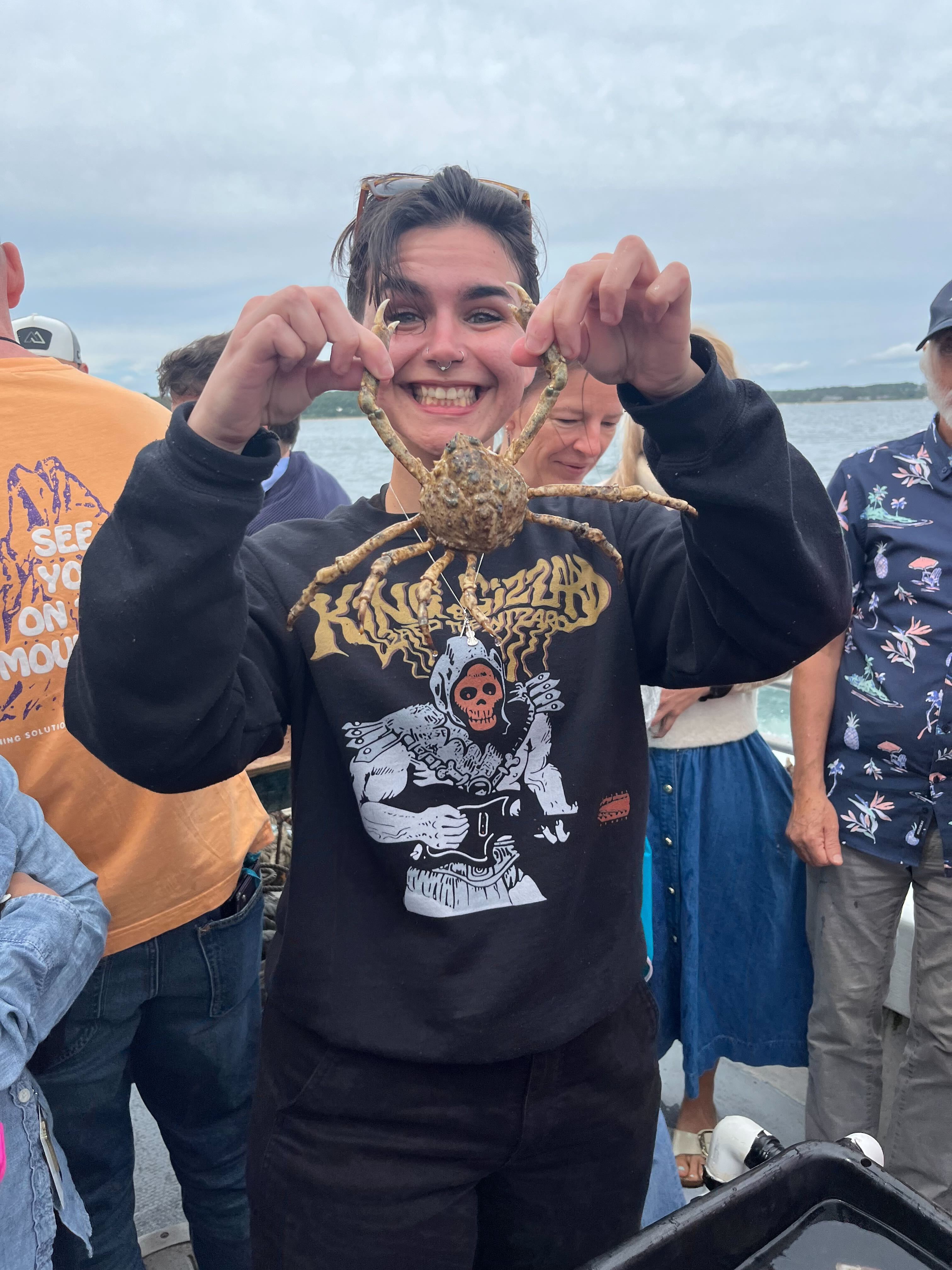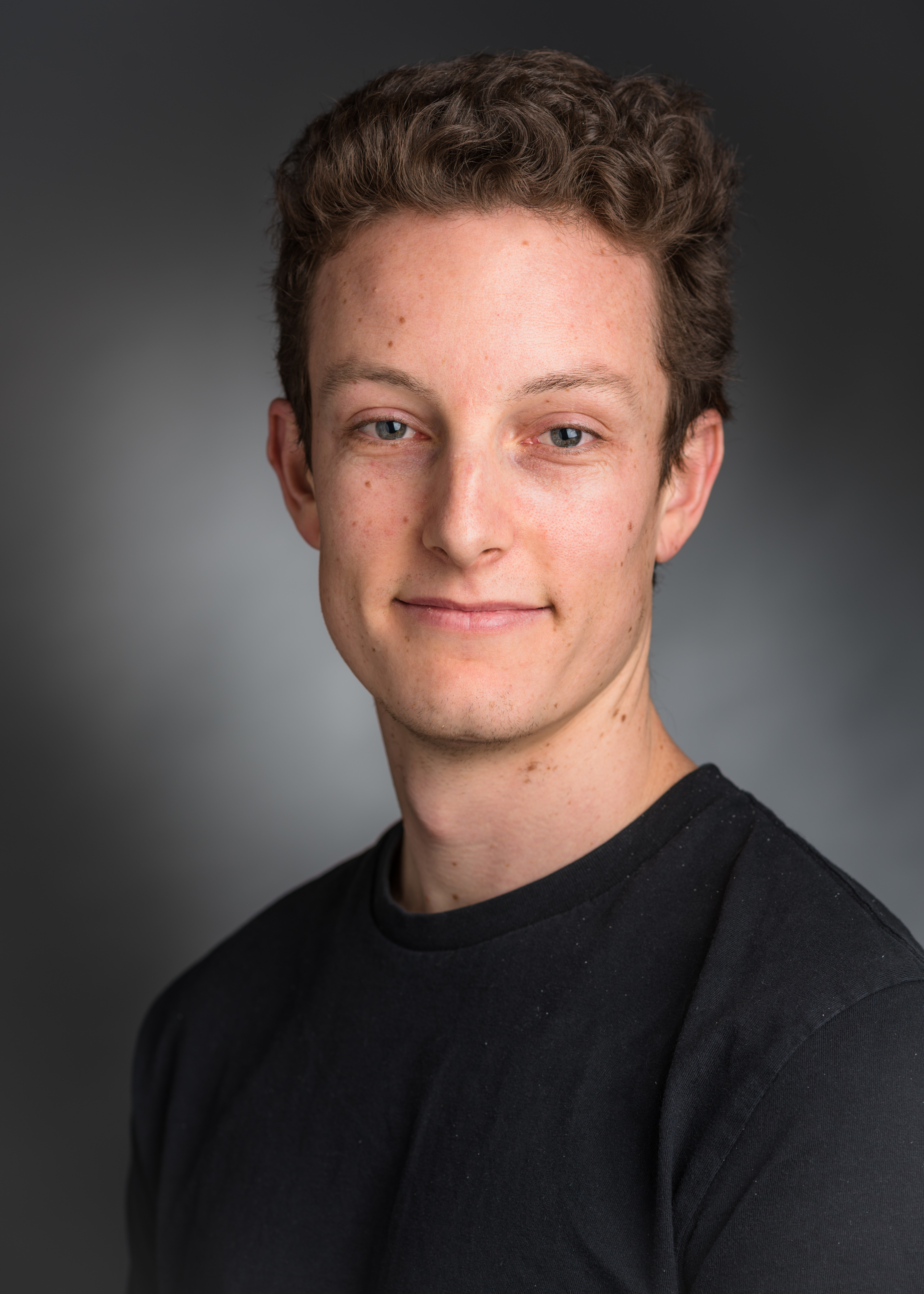
Our Team!
We strive to build a diverse team that welcomes all and works together to do the science of our dreams.See our lab philosophy.

Willow Coyote-Maestas, Ph.D.
he/him/his
Principal Investigator
willow.coyote-maestas (at) ucsf.edu
 0000-0001-9614-5340
0000-0001-9614-5340  Willow's Google Scholar
Willow's Google Scholar  @willowcoyote
@willowcoyote  coywil26
coywil26 Willow graduated from the Evergreen State College with degrees in Chemistry and Environmental studies. As an undergraduate in Dr. Anitra Ingalls’s lab at the University of Washington, he studied how B vitamins mediate microbial interactions and diversity in the open ocean. For graduate school, Willow did his Ph.D. in Dr. Daniel Schmidt’s lab at the University of Minnesota, where he developed massively parallel sequencing-based methods to study and engineer membrane proteins proteins. Willow found mutational and insertional scanning methods can be useful for identifying regions of a protein involved in functionally meaningful conformational changes, developed mechanistic models for how to assemble protein domains to create useful multi-domain protein tools, and studied the evolution of ion channel regulation.
Near the end of his PhD, Willow moved to the SF Bay Area to be close to family for personal reasons and took up residence as a visitor in Dr. James Fraser’s lab at UCSF. Within mere weeks the Covid pandemic struck leading Willow to become stuck in the Bay Area and was convinced to stick around for a bit longer at UCSF as an HHMI Hanna Gray and QBI Fellow. In this role, Willow further developed mechanistic genetic screening approaches for studying how membrane proteins fold, traffic, function, and are regulated. This experience was a tremendous amount of fun and convinced both Willow and the UCSF community to make it an even longer term journey together when Willow was appointed as an Assistant Professor in Bioengineering and Therapeutic Sciences at UCSF.
Overall, Willow is inspired to develop a deep and comprehensive molecular, cellular, and physiological understanding for how membrane proteins allows us to interact with the world around us, how they break to cause the diseases that ail us, and how we can better treat these diseases with therapeutics. More broadly Willow wants to keep growing, learning, and having fun through the scientific endeavor!
Outside of lab Willow enjoys spending time with dear friends and family, creating and listening to music, enjoying and making delicious food, and meandering through nature.

Ever O'Donnell
they/them/theirs
Graduate Student, Biophysics
Ever.ODonnell (at) ucsf.edu
 ever-o-donnell-500b0a211
ever-o-donnell-500b0a211 I’m co-advised by Willow Coyote-Maestas and Robert Stroud. I am combining high throughput mutational scanning with biochemical and biophysical assays to study the mechanistic effects of mutations on transporters. In undergrad, I did my undergrad thesis with Randy Stockbridge, where I did structural and functional characterization of small multidrug resistant transporters. I’m now interested in using chemotherapeutic resistance as a model for studying substrate specificity. I think transporters are really neat :)

Shirlyne Ong
she/her/hers
Junior Specialist
Shirlyne.Ong (at) ucsf.edu
Shirlyne graduated from UC Berkeley with a degree in Microbiology. During her undergraduate studies, she did research abroad at Academia Sinica with Dr. Erh-Min Lai to understand the role of E. coli proteases in modulating the DNase toxins from Type VI secretion systems in A. tumefaciens. Other research projects include developing a cell-to-cell communication platform in tobacco plants using synthetic viruses that deliver CRISPR-designed gRNAs and using EcoFABS to study microbiome interactions in B. distachyon. Currently, Shirlyne is studying how mutations can impact the assembly of NMDA receptors in the neuron, which are essential for learning and memory. These mutations can lead to insight on how various neurodevelopmental disorders are associated with the receptor function.
Outside of lab, Shirlyne likes to explore new hiking trails, develop her food politics blog, and grab coffee with friends.

Rosa Sanchez
she/her/hers
Junior Specialist
Rosa.Sanchez (at) ucsf.edu
Rosa Sanchez received her bachelor’s degree in Molecular and Cell Biology at the University of California, Santa Cruz. As an undergraduate student, she worked in a Biochemistry and Chemistry Lab, under Michael Stone. Here, she learned about the telomeres and telomerase. One of her favorite parts was learning about shelterin proteins and purifying them!
Rosa really enjoys going on long walks, conversations over a cup of tea, and watching comedy. Her favorite foods are pozole and tacos.

Priyanka Bajaj, Ph.D.
she/her/hers
Postdoctoral Scholar
priyanka.bajaj (at) ucsf.edu
 0000-0001-8474-6149
0000-0001-8474-6149  priyanka-bajaj-a81a40104
priyanka-bajaj-a81a40104  Priyanka's Google Scholar
Priyanka's Google Scholar  @Priyank67495046
@Priyank67495046 Priyanka did her Bachelor’s in Biochemistry at Sri Venkateswara College, University of Delhi and her Master’s in Biochemistry at the University of Hyderabad. She completed her Ph.D. from Molecular Biophysics Unit, Indian Institute of Science under Prof. Raghavan Vardarajan. Her Ph.D. work involved developing high-thoughput screens for measuring the mutational sensitivity of the toxin component of the toxin-antitoxin system of E. coli. She carried out deep mutational scans of the site-saturation mutagenesis library and single-site synonymous mutant library of the toxin gene in operonic context.
In the Coyote-Maestas lab, Priyanka will perform deep mutational scanning on cancer-related proteins co-mentored by Dr. James Fraser.
Outside the lab, Priyanka likes to dance, go on adventurous trips and explore the city.

Noah F. Greenwald
he/him/his
Postdoctoral Fellow
noah.greenwald (at) ucsf.edu
https://ngreenwald.github.io/
 0000-0002-7836-4379
0000-0002-7836-4379  noah-f-greenwald-33656287
noah-f-greenwald-33656287  Profile
Profile  Noah's Google Scholar
Noah's Google Scholar  @NoahGreenwald
@NoahGreenwald  ngreenwald
ngreenwald Noah received his Bachelor’s in Biophysics from Harvard University. He then worked at the Broad Institute, where he analyzed DNA sequencing data to identify the genomic drivers that separate low-grade and high-grade brain cancers. Following his work at the Broad, he received his Ph.D in Cancer Biology from Stanford University, where he was co-advised by Mike Angelo and Christina Curtis. While at Stanford, Noah developed machine learning tools to profile highly-multiplexed imaging data. He then used these tools to characterize the tumor microenvironment in breast cancer patient samples, combining this spatial information with paired DNA and RNA sequencing data to predict patient response to immunotherapy. In the Coyote-Maestas lab, Noah will be using deep mutational scanning to understand the cross talk between cancer and immune cells.

Matthew K. Howard
he/him/his
Graduate Student, Tetrad
matthew.howard (at) ucsf.edu
https://matthewkhoward.com
 0000-0002-2128-2065
0000-0002-2128-2065  matthew-howard-5098a5197
matthew-howard-5098a5197  Profile
Profile  Matthew's Google Scholar
Matthew's Google Scholar  @matthewkhoward
@matthewkhoward  matthewkarlhoward
matthewkarlhoward Matt’s research focuses on developing and using mutational scanning platforms to study GPCR biology with the goal of generating holistic models for how receptors work at the protein level, and how perturbations propagate across cell biology and physiology. Prior to UCSF, Matt graduated from Washington University in St. Louis with degrees in chemistry and biology. At WashU, Matt worked in the Jackrel Lab studying structure- function relationships in the disaggregase Hsp104 and strategies for disrupting biofilm- associated amyloids.

Christian Macdonald, Ph.D.
he/him/his
Postdoctoral Scholar
christian.macdonald (at) ucsf.edu
 0000-0002-0201-8832
0000-0002-0201-8832  Profile
Profile  Christian's Google Scholar
Christian's Google Scholar  @protostasis
@protostasis  odcambc
odcambc Christian graduated from Arizona State University with degrees in Mathematics and Biochemistry, where he conducted research in the total synthesis of marine natural products with Dr. George Pettit. Afterwards, he attended the University of Michigan for his Ph.D. in Biophysics. In Dr. Randy Stockbridge’s lab, he studied the evolution and function of a number of membrane protein families. As a postdoctoral fellow Chris is co-mentored by Dr. James Fraser working on developing deep mutational scanning molecular biology and computational pipelines and applying these to study the evolution of bacterial antibiotic resistance.
Outside of lab, he enjoys books, music, being outdoors and/or on a bike, and drinking too much coffee.

Jingyou Rao
she/her/hers
Postdoctoral Scholar
roserao (at) ucla.edu
https://roserao.github.io/
 0000-0002-4331-8786
0000-0002-4331-8786  Jingyou's Google Scholar
Jingyou's Google Scholar  @JingyouR
@JingyouR  roserao
roserao Jingyou is a proud Double Bruin, having earned both her undergraduate degrees in Computer Science and Computational Biology, as well as her Ph.D. in Computer Science from UCLA. In the final year of her Ph.D., she had the pleasure of collaborating with the lab, occasionally trading the keyboard for pipettes waiting for computation tasks to complete. She’s excited to officially join the lab as a postdoc, where she will focus on high-order mutational scanning screens - both generating the data and developing models and theories for it.

Catherine H. Shin
she/her/hers
Graduate Student, CCB
catherine.shin (at) ucsf.edu
 0000-0001-7937-1338
0000-0001-7937-1338  Profile
Profile  Catherine's Google Scholar
Catherine's Google Scholar Catherine attended Simon Fraser University for her undergraduate studies and investigated redox reactions in the blue copper protein azurin. For her PhD, she is co-mentored by Dr. Brian Shoichet and studies the mechanism of ligand-dependent GPCR activation to develop better therapeutics. When she is not thinking about science, Catherine enjoys taking photos, listening to podcasts, and visiting the different store cats throughout the city.

Zara Y. Weinberg
she/her/hers
Staff Scientist
weinberz (at) gmail.com
 0000-0001-7176-038X
0000-0001-7176-038X  Zara's Google Scholar
Zara's Google Scholar  @weinberz
@weinberz  weinberz.witchlab.org
weinberz.witchlab.org  weinberz
weinberz Zara is a cell and synthetic biologist interested in understanding and rewiring how cells perceive their environment. Zara’s training has encompassed behavioral neuroscience, cell signaling and G protein-coupled receptor signaling and trafficking, and synthetic biology and cell engineering. Throughout this work, Zara has focused on training in pedagogy and mentorship in the hopes that she can contribute to training the next generation of scientists and make science more accessible and fun for all. As a Staff Scientist in the Coyote-Maestas lab, Zara is using her cell signaling and engineering knowledge to build assays that can help apply the lab’s expertise to new proteins and physiological systems. Outside of lab, Zara loves time spent with her chosen family, hiking in cities and in nature, listening to sad and angry women who play guitars, and loudly sharing her unfiltered opinions with anyone who will listen.
Affiliates
Coyote-Maestas Lab Alumni
Donovan Trinidad
Graduate Student, BMS (F31 NRSA)
he/him/his
2021 - 2024
Subsequently: Postdoctoral scholar @ Silas lab, Gladstone Institutes



Nicholas Campbell
Summer Student
he/him/his
2023 - 2025
Subsequently: Undergraduate student @ Stanford University
Patrick Rockefeller Grimes
Junior Specialist
he/him/his
2022 - 2023
Subsequently: PhD student @ UCSF in Biophysics


Jenna Pellegrino, Ph.D.
Graduate Student, Biophysics (NSF GRFP)
she/her/hers
2021 - 2022
Subsequently: Scientist @ ArrePath



Undergraduate Interns
John Collinge - SRTP Student
he/him/his
2025
Subsequently: Undergraduate student @ Fort Lewis College
Jocelyn Chavez Rios - SRTP Student
she/her/hers
2024
Subsequently: Undergraduate student @ University of Nevada, Las Vegas
Henry Gatica-Gutierrez - SRTP Student
he/him/his
2022
Subsequently: PhD student @ Rice University in Systems, Synthetic, and Physical Biology